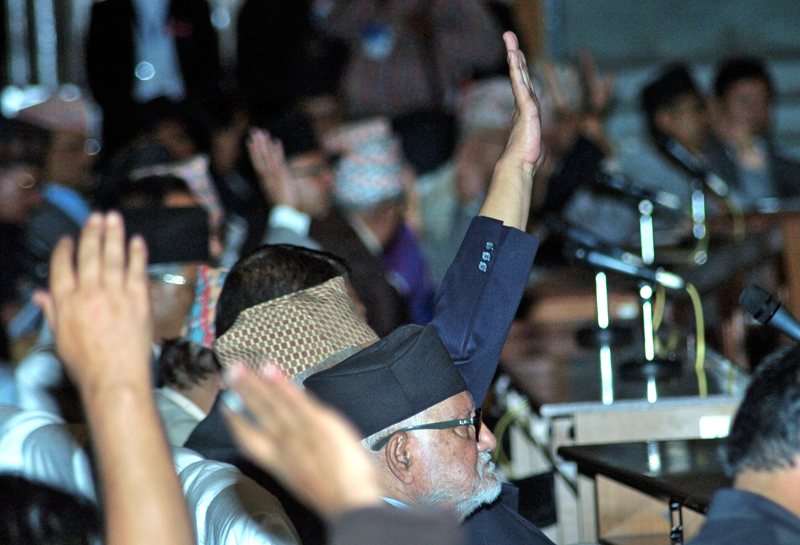CA likely to promulgate constitution on Sept 20
Kathmandu, September 14
Constituent Assembly Chairman Subas Chandra Nembang today said he hoped that the President would announce commencement of the new constitution from CA meeting at 5:00pm on September 20.
Meanwhile, on the second day of final voting today, CA endorsed 57 of 302 articles with two-thirds majority. The voting will resume at 10:00am tomorrow.
“The voting on all articles is likely to be completed by September 17. By September 19, the process of signing the copy of the new constitution by CA members and authenticating it by the CA chair will be completed. After holding consultations with leaders of major parties today, I have set 5:00pm on September 20 for announcing the commencement of the new constitution,” Nembang told THT.
It will be a formal and the last meeting of the CA and President Ram Baran Yadav will be invited to announce the commencement of the new constitution as per the CA Rules. “I will hand over a formal letter to President Yadav at a meeting scheduled with him for 9:00am tomorrow,” Nembang said. Foreign dignitaries and diplomats will be invited to participate in the ceremony. It will be a short programme, as the President will just announce the commencement of the new constitution on the occasion.
The CA has adopted the process of settling the amendment proposals and endorsing every article together, making the endorsed articles a part of the new constitution. Once all articles and parts of the constitution bill are endorsed one by one, the CA will endorse the entire bill through split vote.
The CA, however, rejected demands for split vote, instead of voice vote, on two issues. Though voice vote has been adopted to endorse each article, two CA members — Kamal Thapa of Rastriya Prajatantra Party-Nepal and Hari Charan Sah of Nepali Janata Dal – demanded split vote on two issues — scrapping of provision of federalism and addition of some inclusive terms in Article 4. However, their demands were rejected after they failed to garner support of at least 61 members for the same, as per the CA Rules. Only 25 members supported Thapa, while six supported Sah.
Key rejected and accepted issues
Three major political parties —Nepali Congress, CPN-UML and Unified CPN-Maoist — whose combined strength exceeds two-thirds majority, have been united in voting to endorse articles of the new constitution, as well as rejecting or accepting amendment proposals.
What was rejected
- Right to self-determination in preamble
- Birthplace of Gautam Buddha and Sanatan Hindu State in preamble
- Constitutional monarchy
- Complete press freedom instead of press freedom
- People’s War and Madhes Movement and Indigenous Nationalities’ Movement in preamble
- Sanatan Hindu State instead of secularism
- Complete Proportional Representation in preliminary section
- English, and other active mother tongues, as official language after Nepali
- Multi-lingual policy on official language after Nepali
- Recognising Nepali and other languages recommended by Language Commission as official languages
- Change of national flag
- One-horned rhino as national animal
- 16-year-old to get citizenship and voting rights
- Monitoring of Indo-Nepal borders
- Restriction of advertisement of alcohol, beer, wine and cigarettes
- Nepali media should carry ads of Nepali citizens’ voice, language, pictures and films
- Right to practice customary laws
- Determination of property ceiling
- Prohibition on keeping property in foreign countries
- Right to receive important information in mother tongue
- Right to free and compulsory education up to higher secondary and free higher education
- Right to free higher education for women
- Free treatment of expensive ailments
- Capital punishment on severe crimes against women
- Separate province for Tharu-dominant districts with Kailali and Kanchanpur
- Decentralisation instead of federalism
What got accepted
- Clarification on Secularism
- Existing national flag
- Cow as national animal
- “Or” provision in citizenship
- Seven-province federal model
- Nepali language as official language
- Duties of citizens under fundamental rights
- Entire Baglung district included in Province No 4






